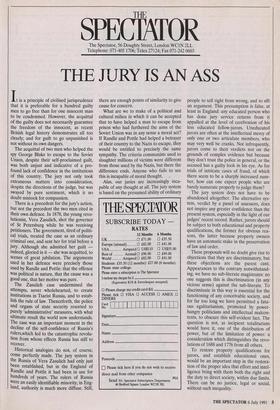The Spectator, 56 Doughty Street, London WC1N 2LL Telephone: 071-405
1706; Telex 27124; Fax 071-242 0603
THE JURY IS AN ASS
It is a principle of civilised jurisprudence that it is preferable for a hundred guilty men to go free than for one innocent man to be condemned. However, the acquittal of the guilty does not necessarily guarantee the freedom of the innocent, as recent British legal history demonstrates all too clearly; and for guilt to go unpunished is not without its own dangers.
The acquittal of two men who helped the spy George Blake to escape to the Soviet Union, despite their self-proclaimed guilt, was both unjust and indicative of a pro- found lack of confidence in the institutions of this country. The jury not only took extraneous matters into consideration, despite the directions of the judge, but was swayed by pure sentiment, which it no doubt mistook for compassion.
There is a precedent for the jury's action, but not the precedent the two men cited in their own defence. In 1878, the young revo- lutionist, Vera Zasulich, shot the governor of St Petersburg while he was receiving petitioners. The government, tired of politi- cal trials, treated the case as an ordinary criminal one, and sent her for trial before a Jury. Although she admitted her guilt Indeed, gloried in it — she was acquitted, to scenes of great jubilation. The arguments used in her defence were precisely those used by Randle and Pottle: that the offence was political in nature, that the cause was a good one, that her motive was pure.
The Zasulich case undermined the attempts, never wholehearted, to create institutions in Tsarist Russia, and to estab- lish the rule of law. Thenceforth, the police and organs of state security resorted to purely 'administrative' measures, with what ultimate result the world now understands. The case was an important moment in the decline of the self-confidence of Russia's rulers,which led to the catastrophic revolu- tion from whose effects Russia has still to recover.
Historical analogies do not, of course, come perfectly made. The jury system in the Russia of Vera Zasulich had only just been established, but in the England of Randle and Pottle it had been in use for hundreds of years. The rulers of Russia were an easily identifiable minority; in Eng- land, authority is much more diffuse. Still, there are enough points of similarity to give cause for concern.
What are we to make of a political and cultural milieu in which it can be accepted that to have helped a man to escape from prison who had furthered the aims of the Soviet Union was in any sense a moral act? If Randle and Pottle had helped a betrayer of their country to the Nazis to escape, they would be entitled to precisely the same sympathy. The criteria communists used to slaughter millions of victims were different from those used by the Nazis, but there the difference ends. Anyone who fails to see this is incapable of moral thought. . Alas, our juries are increasingly inca- pable of any thought at all. The jury system is based on the presumed ability of ordinary people to tell right from wrong, and to sift an argument. This presumption is false, at least in England: any educated person who has done jury service returns from it appalled at the level of cerebration of his less educated fellow-jurors. Uneducated jurors are often at the intellectual mercy of only one or two articulate members, who may very well be cranks. Not infrequently, jurors come to their verdicts not on the grounds of complex evidence but because they don't trust the police in general, or the accused has a guilty look in his eye. As for trials of intricate cases of fraud, of which there seem to be a sharply increased num- ber, how can one expect people who are barely numerate properly to judge them?
The jury system does not have to be abandoned altogether. The alternative sys- tem, verdict by a panel of assessors, does not inspire any greater confidence than the present system, especially in the light of our judges' recent record. Rather, jurors should be subject to both educational and property qualifications, the former for obvious rea- sons, the latter because property owners have an automatic stake in the preservation of law and order.
These proposals will no doubt give rise to objections that they are discriminatory, but these objections are the purest cant. Appearances to the contrary notwithstand- ing, we have no sub-literate magistrates: no one suggests this is discrimination (in any vicious sense) against the sub-literate. To discriminate in this way is essential for the functioning of any conceivable society, and for far too long we have permitted a fatu- ous egalitarianism, promoted by power- hungry politicians and intellectual malcon- tents, to obscure this self-evident fact. The question is not, as incipient totalitarians would have it, one of the distribution of power, but of the limitation of power: a consideration which distinguishes the revo- lutions of 1688 and 1776 from all others.
To restore property qualifications for jurors, and establish educational ones, would be an important step in the restora- tion of the proper idea that effort and intel- ligence bring with them both the right and the duty to direct society, within due limits. There can be no justice, legal or social, without such inequality.


















































 Previous page
Previous page